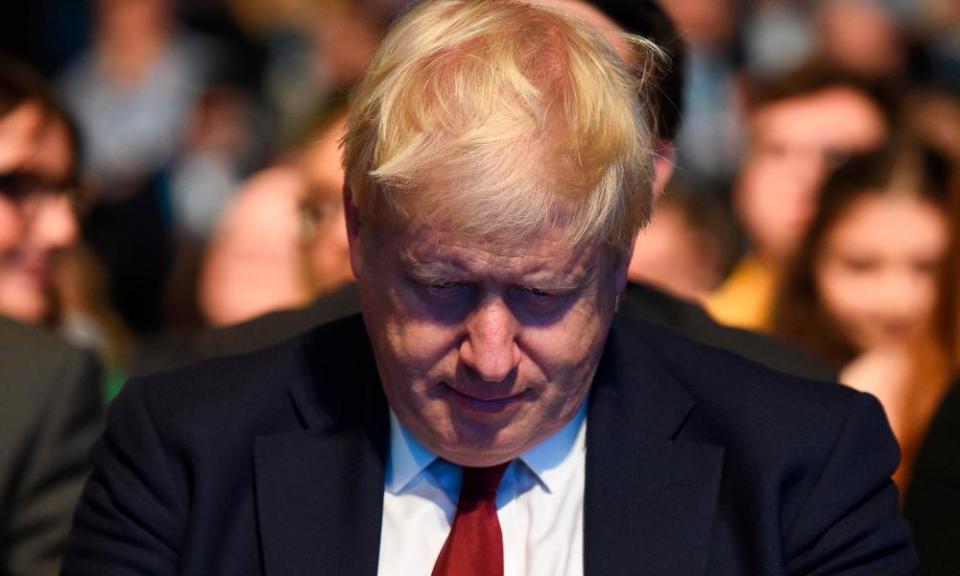Johnson has run out of road. Other people’s outrage is all he’s got now

Boris Johnson is routinely dismissed as a liar for whom the truth is just another fling. So it is all the more perplexing that his bluster about a no-deal Brexit is taken seriously. The truth is that Johnson does not want a no-deal Brexit – and certainly not one that precedes a general election.
Let’s start with the genesis of no-deal Brexit. It was an exemplar of Theresa May’s politics: a tactic invented to force her will on parliament rather than to engage in the hard graft of consensus-building political leadership. It was also an embarrassingly misguided attempt to threaten the European Union.
But this gruesome political tactic metamorphosed into a political ideal, largely due to May’s own rhetoric. She did not say “it will be my deal or no deal” but rather “no deal is better than a bad deal”. It took a special depth of hubris to be so oblivious to the utopian expectations of the leave campaign – which could obviously never be met. Any deal would necessarily be dismissed as falling short.
The problem, then, for Johnson is that no deal is an inherently dumb idea: it is plainly not in our interests to wreck all our trading relationships overnight and endure all the attendant chaos, only to negotiate a deal from a weakened position outside the bloc rather than within it. The specific political problem for him is that if he delivers a no-deal exit from the EU, then the ensuing chaos would all but guarantee that he would lose a general election that followed. While May never truly countenanced no deal, because she understood it would be a disaster for the country, Johnson will avoid it for the sake of self-preservation.
So what happens next? It seems highly unlikely that Johnson will get a deal: no work has been done with the EU to secure it, his own foreign secretary has attacked EU leaders, and his toxic behaviour in parliament reveals he has no intention of even trying to secure a majority in the Commons. The botched prorogation supplied parliamentarians with enough time to act to block no deal. Now Johnson is again aiming to manoeuvre his opponents into delivering his preferred outcome – an extension followed by a general election where he can rally support around the future fantasy of a no-deal exit.
So it seems quite plausible that Johnson will resign as prime minister after the European council summit in mid-October – saying that it will be for someone else to “wave the white flag” to Brussels – but remain as Tory leader to fight the subsequent general election. While the Lib Dems, Tory rebels and SNP might be willing to install Jeremy Corbyn as prime minister to request an extension, it is in all their interests to insist on an election immediately afterwards.
So the real path to no deal is a Johnson election victory where he is so bound into his party’s extreme position that even with a majority he cannot convince them to vote for any deal. Indeed, the true fight over any no-deal Brexit will take place in the coming general election.
So far, Johnson’s opponents have won some battles while losing the wider contest. There is no doubt that Johnson’s behaviour over prorogation was reprehensible, and his threats to disobey the law disgraceful, but that does not make these things politically salient. The people he is appealing to think they want a “strong leader” who will “break the rules”. So, just as with the outrage about his deliberate, calculated bigotry, putting this behaviour at the centre of politics serves only to amplify his message. The painful truth is that many people simply do not care for process or procedure.
Related: The Tories have lost their ideology. Now they are merely the party of resentment | William Davies
Johnson’s opponents would do far better to expose the absurdity of his stated policy positions, and their impact on peoples’ lives. Ask him how tailbacks will be managed in Kent to keep food on supermarket shelves; about the plan for a cold chain for critical medicines to keep people alive; or what will happen to the automotive industry and the thousands of jobs within it. Interrogate him on the detailed timeline for the negotiations with the EU after a no-deal exit. What would happen if the EU refused to talk until Britain agreed to the backstop and financial settlement? How many years does he expect the negotiations to last? Why would they produce a different result when Britain has less leverage?
The truth is, this strongman is weak. The law has been passed to prevent no deal, so he has already lost. Despite all his bluster, Johnson has to make a deal with the EU, request an extension, or resign. We fail to expose this defeat only if we dance to Johnson’s tune and let him shape future arguments in his favour. We are discovering that living through history feels less monumental than monumentally stupid.
• Tom Kibasi is director of the Institute for Public Policy Research. He writes in a personal capacity

